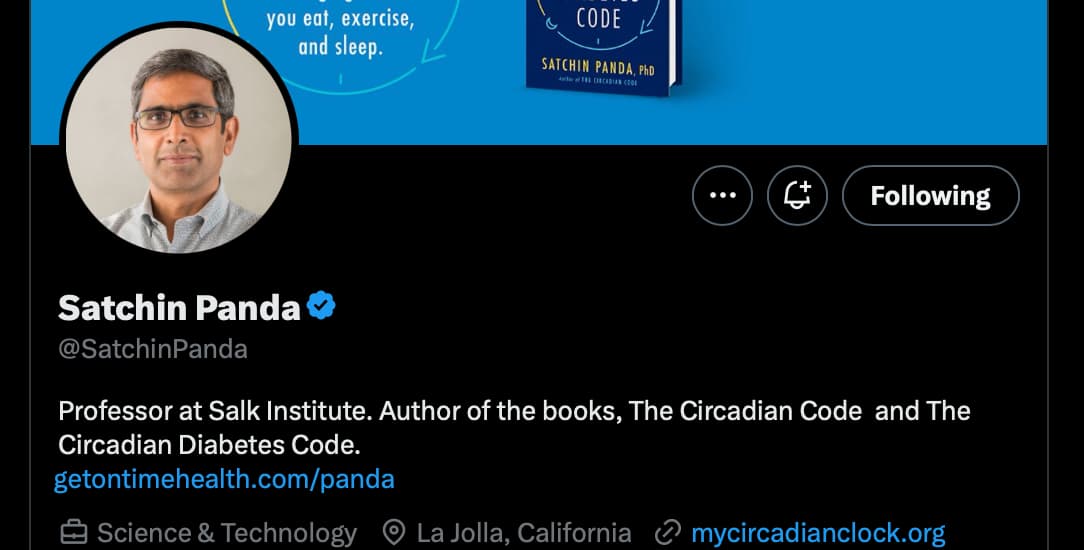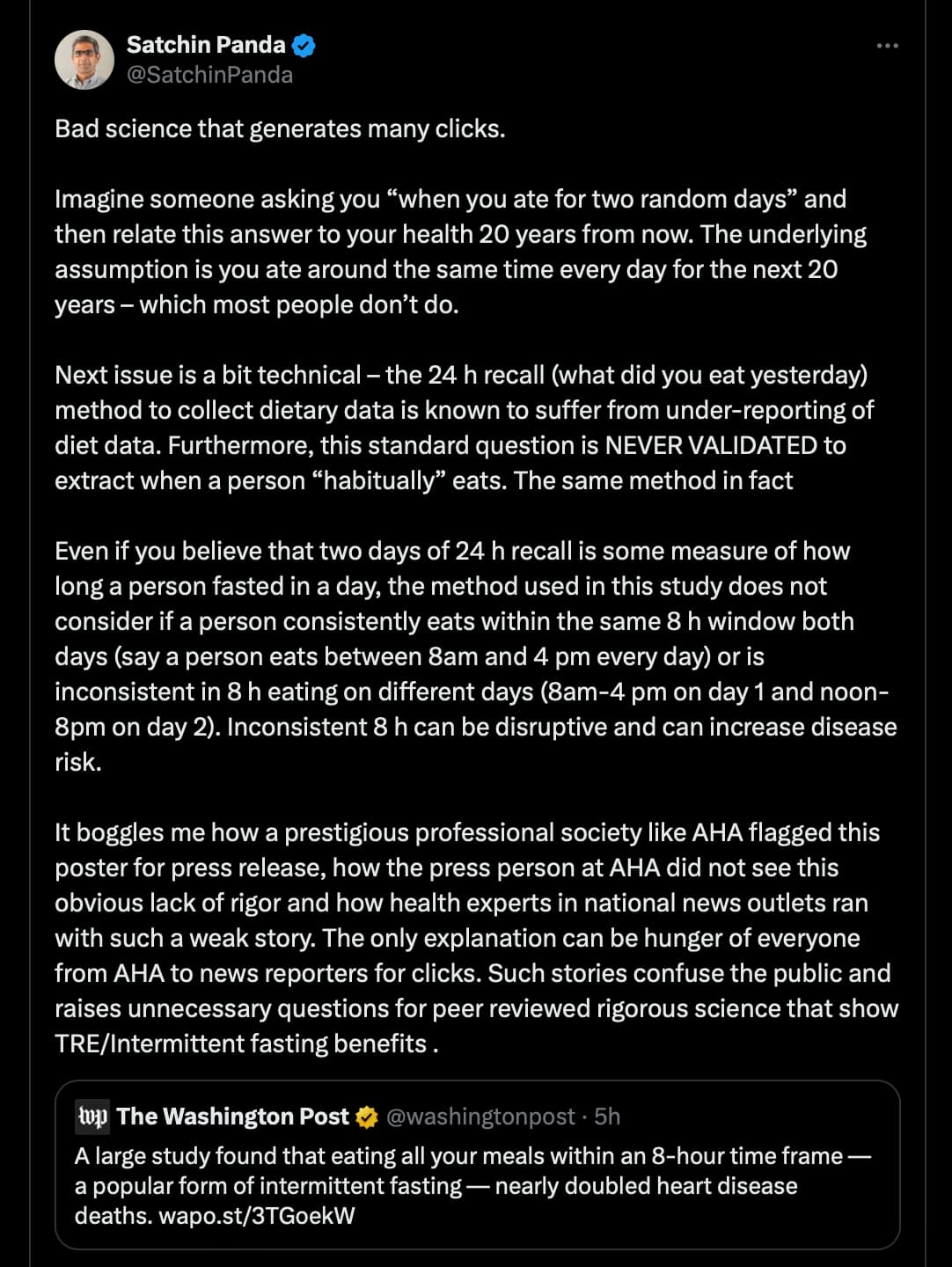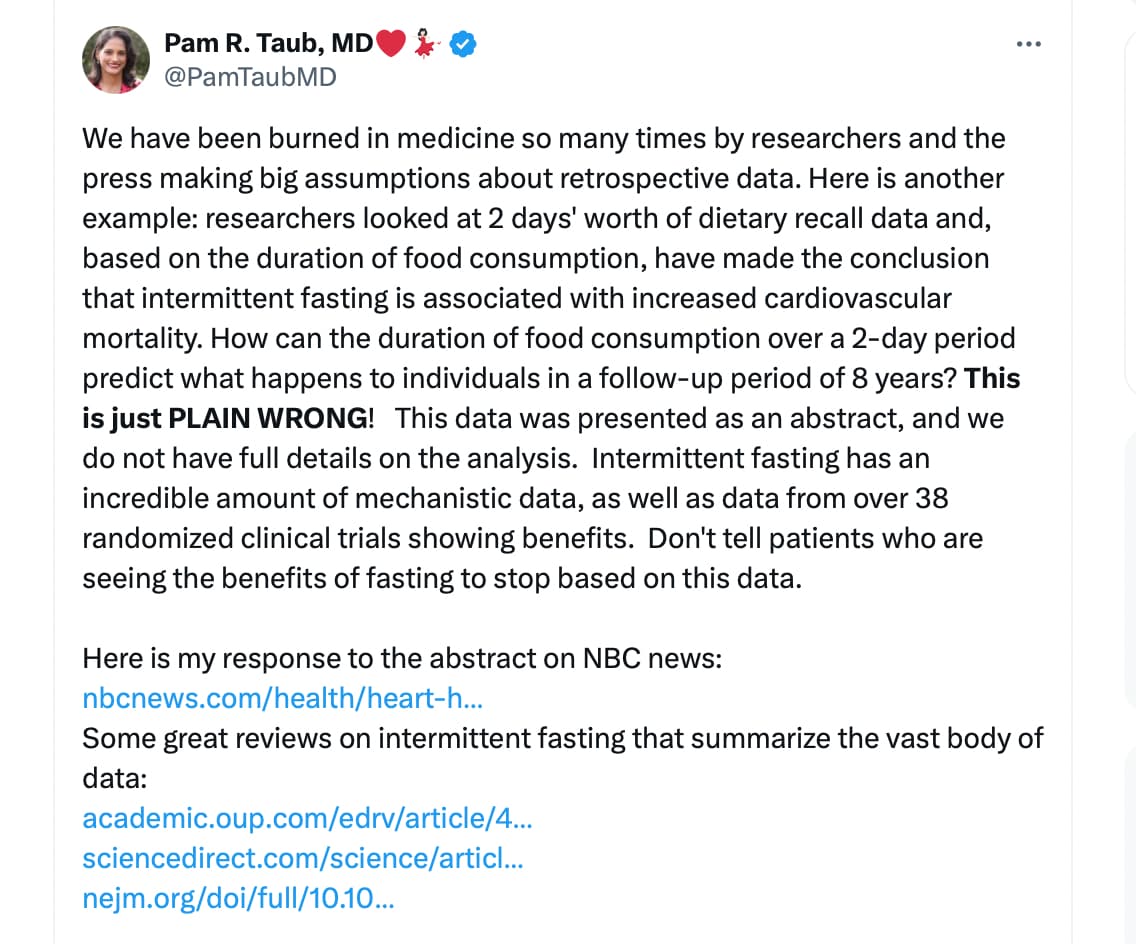Is there a link to the original research?
Doesn’t sound like much. I went the the AHA website and queried for time restricted eating. It returned dozens of publications, most seemed positive from the titles, but I did not see this article.
https://www.ahajournals.org/action/doSearch?AllField=“victor+w+zhong”
The search was for “victor w (wenze) zhong”. The query returned ten articles by Victor W. Zhong, none of which was about time restricted eating.
This morning, I saw this 91% news item disappear from two news feeds. I wonder if it was pulled.
Probably would depend more on what they ATE during those 8 hours than the TRE itself.
You can find trials that contradict almost all the prevailing wisdom on interventions. Here are some of the comments from Brian Kennedy on that variability.
- Brian Kennedy -
“I also think we have to realize that biology is not a system where we can reduce the variables sufficiently to guarantee that we’re all doing the same experiment. We’ve seen this with the ITP program, which is an intervention testing program studying longevity interventions in mice through the National Institute of Aging. There are three different sites, all very good scientific sites, all do very well-controlled experiments, but they’ve had cases where rapamycin extends lifespan here but not there, and they traced it all the way back to the food source or some other issue.”
"Reproducibility is not always easy, even if you have great scientists involved. There are just a lot of variables, especially in a long-term study in a mammal. Not everybody’s going to get the same result, and when they don’t, it’s not the time to start having a fight. What we need to be doing is sorting out what the reasons are, why there was something that works here and doesn’t work there.
Even with mice, we don’t give them the healthiest diets all the time. We don’t let them exercise that much. We keep them under stress conditions. Maybe some of the interventions that we think are anti-aging are actually helping with the lifestyle of the animal rather than affecting the maximum lifespan."
From here:
https://www.lifespan.io/news/dr-brian-kennedy-from-sickcare-to-healthcare/
And just for reference here are recent threads that went against conventional wisdom:(starting with @A_User 's favorite)
https://www.rapamycin.news/t/higher-ldl-cholesterol-is-associated-with-greater-longevity/12338?u=ng0rge
https://www.rapamycin.news/t/sauna-study-fails-to-show-benefit/9664?u=ng0rge
https://www.rapamycin.news/t/eating-too-much-protein-is-bad-for-your-arteries-and-this-amino-acid-is-to-blame-upitt/12270?u=ng0rge
https://www.rapamycin.news/t/niacin-revisited-helpful-or-harmful-in-cardiac-health/12263?u=ng0rge
https://www.rapamycin.news/t/metformin-shortens-lifespan-in-the-elderly/12140?u=ng0rge
It is known, just weaponized, not meant for consumption outside of research settings (because of flawed methodologies, reverse causation).
The most important thing people should think about is causality, and some people don’t understand it nor has a model of the world in their mind. They just put words together without working on a model of the world…
Kennedy makes an especially important point with respect to the mice sites. I used to feel this way when we ran experiments on Sprague Dawley rats. A well designed study could assess the marginal difference between an intervention and a non-intervention, or multiple interventions and a non-intervention but it must be remembered that the non-intervention is not executed in a normal environment for rats, etc.
On the other hand, this point of individual differences should not be extended to a generalized claim of non-reproducibility. It is overstated if it does. So long as unexplained variance is examined and accounted for, individual differences across multiple dimensions can cancel out with large appropriately created samples. (Appropriate is determined by context.) You don’t want to end up defending a position analogous to saying that eGFR or IQ can’t be assessed and its distribution characteristics can’t be meaningfully measured and examined in relation to other IVs or DVs, just because each person’s processes and environments are to some degree unique. The majority of the medical benefits we enjoy today, including those we are discussing here trace back to research in which it is all but certain that no two individual cases were identical. Scientific designs are built to tackle those issues.
I think this definitely plays a role. A lot of people who do IF eat a lot of “unhealthy” foods in that eating window.
Study finds 91% increase in risk of death from cardiovascular event for those on intermittent fasting. Still skipping breakfast, Peter Attia?
But of course yet another miss-use of epidemiological studies to get draw headlines. They knowingly pull granula data from general questionnaire answers and then articles are written high on drama and sensationalism etc. They are designed to grab headlines. It has be done for almost half a century on ketogenic/atkins diets. It was proven wrong. What tgey do is disingenuous at best and willfully deceitful and misleading at worse.
An 8 hr window is no intermittent fast its skipping breakfast and not eating dinner too late. 11-12 lunch and 7-8 pm dinner fits the window. I would say thats more a typical american meal freq. There was also no refinement or adjustments on what was eaten. So being typical Americans its a typical american diet full off highly processed foods sodas high sucrose and fructose lots of soybean oils etc. Please show me any meal freqyency that can make crap food healthy just by time between meals.
As I said these type of articles and the research pulled like this from epidemiological studies are to create headlines and drama and miss lead the uninformed public.
No matter what diet you follow the food being shoved down your pie-hole has to be clean high quality minimally processed if you expect to be health.
One thing we taught our childern was when your grocery shopping if the food does not require a nutritional label its a very good indication its not processed and is very close to its natural state. The only exceptions are things like unadulterated frozen vegetables and meats. But we are blessed and have a farm and large garden andcraise our own animals so we freeze and can our own for the whole extended family.
One researcher’s opinion on my twitter feed.
Source: https://x.com/SatchinPanda/status/1769976780461674793?s=20
Washington Post Coverage:
Full story: The intermittent fasting trend may pose risks to your heart
I may be an outlier here, but I do value these epidemiological studies. If only as a reminder of what we don’t know ans the assumptions we may be unwittingly making. Yes they don’t show causation but they can form part of the evidence when RCTs are limited. And I see them as indicators/guidance for further research.
Assuming the cohorts were well matched, the quality of the diet may be very similar. But it would interesting to hear what cultural trends could lead to IF proponents having a particularly bad diet.
Self reporting is of course a major limitation. But, I still think the outcome of studies like this one, can help build up a picture and inform say, an intervention trial which looks at cvd biomarkers.
These studies i find reassuring for IF
IF neutral for inflammation:
IF positive for ldl:
But the cohort study is a reminder to keep open mind
I have not read this report, but I understand there is an argument that skipping the morning breakfast is not a good idea and that any restriction on eating should be in the evening.
However, there are so many confounding factors in things like this that getting reliable conclusions would be really hard.
https://x.com/pamtaubmd/status/1769969951606276490?s=46&t=g51H5gL_rX6JIVg_7VgkQg
See X post for details. Quote below. Apparently this study was a bit silly. I intend to disregard.
“… researchers looked at 2 days’ worth of dietary recall data and, based on the duration of food consumption, have made the conclusion that intermittent fasting is associated with increased cardiovascular mortality”
Another possible source of error in this design, likely smaller if present at all, is differences in behavior of people who know or think they might have ASCVD or that such is present in their family.
Separately, I am familiar with the dietary recall questionnaires. Some have improved recently but they invited gross errors 20 years ago because they were developed by medical scientists and not measurement scientists. A more accurate method of assessing self-repotted eating habits is to first ask for a modal response (e.g., what is your most common timing for daily eating (inserting an explanation), allowing the respondent to select a start time and end time) followed by asking how many days the respondent typically follows this pattern and, again, asking for a typical pattern if one exists on alternate days. Good design can simplify this assessment and greatly increase the validity of the response. I do not think Dr. Panda’s 24 hour recall objection is especially valid with respect to this specific question. Multiple studies show that specific food recall can be poor but they do not apply to recalling the time meals were consumed.
My two immediate thoughts are:
-
People tend to time restrict feeding to evenings resulting in worse metabolic health. You should time restrict your feeding to morning and early afternoon.
-
People who are into fasting tend to also be low carbohydrate dieters which we know increases all cause and cardiovascular specific mortality.
The idea that time restricted feeding is bad for you (especially in a very mild form of an 8 hour window) flies in the face of most other data we have on it.
I’m sure this has been covered elsewhere but if you could point me to some papers I’d love to read them
This is a landmark paper from the famous Nurses’ Health Study:
and a (slightly) more recent Meta-Analysis to round it out:
To be clear it is perfectly possible that a well constructed low carbohydrate diet using unsaturated fats, more plant protein, plenty of fibre etc could be a very healthy diet but the population data shows people performing worse on low carb diets.


